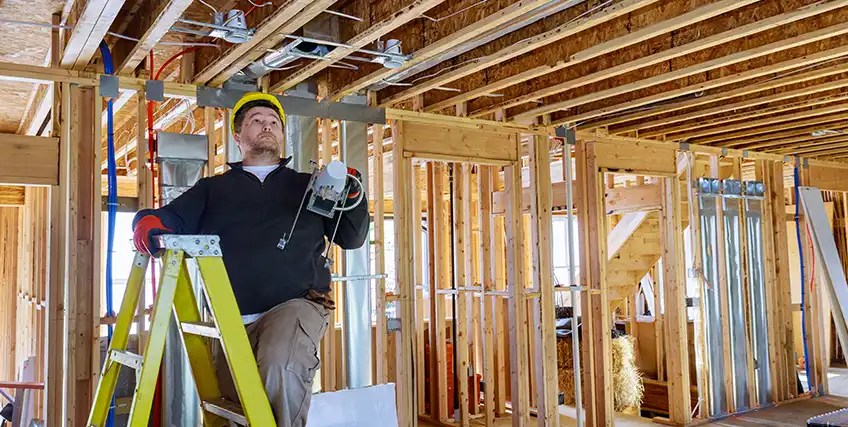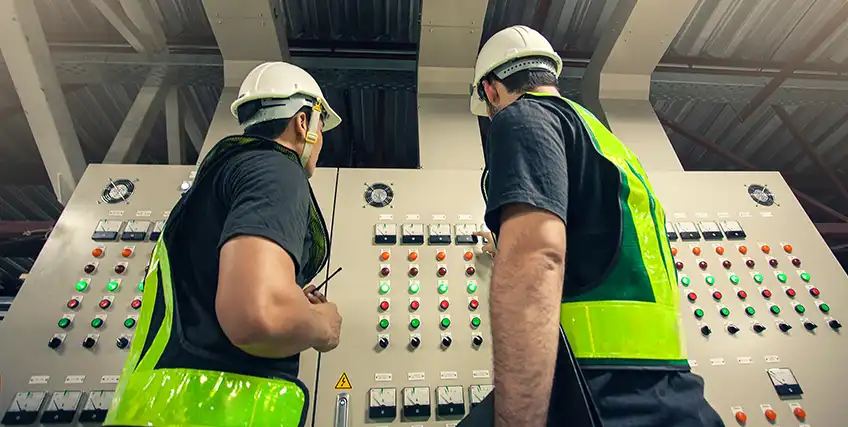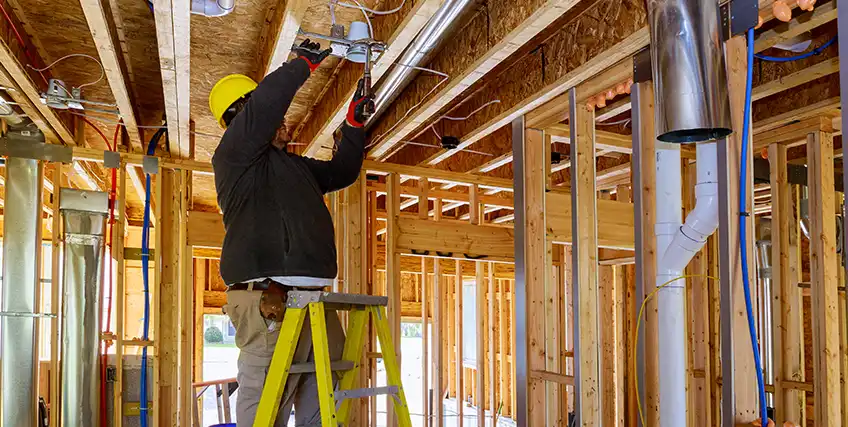Powering Your Business: A Complete Guide to SBA Loans for Electrical Contractors
April 02, 2025 | Last Updated on: April 07, 2025

Electrical contracting businesses play important roles in their communities. Every home and business have electrical systems, and they all need electrical work from time to time to ensure they’re running smoothly. From rewiring a few outlets to installing electrical services for an entire new construction, electricians are crucially important to safe and functional buildings.
That said, an electrical contractor business can be competitive, and if referrals slow down for a while, you may struggle to meet cash flow and working capital needs. That could keep you from expanding your electrical contracting business or offering new and better services. More importantly, it may prevent you from investing in the best tools and equipment, like advanced diagnostic devices and modern safety gear.
Whether you’re struggling to meet growing operation costs or looking to start a new business and grow it quickly, U.S. Small Business Administration (SBA) loans are a great resource.
In this article:
- Options for SBA loans to start a business, SBA business expansion loans, and working capital loans.
- How to get SBA loan funding as an electrical contracting business.
- Alternative financing options to SBA loans.
Why you might need financing
Electrical contracting businesses have many costs. Like any small business, it’s crucial to balance day-to-day operating costs, long-term costs, and incomes to ensure your business grows sustainably.
Some of the reasons an electrician business might use a small business loan include:
- Operational expenses: These may include everything from employee salaries, office rent, vehicle leases and insurance, and the tools and materials necessary for a project, from screwdrivers to specialized equipment.
- Equipment purchases: You may have to upgrade old equipment or get new equipment to stay up to date with modern standards.
- Marketing expenses: If you’re looking to grow your customer base, you may want to invest in a marketing campaign that uses social media, SEO, email, and other marketing channels to attract potential customers. Hiring an outside company to create a marketing strategy for your service business may be more cost-effective.
- Business expansion: Expanding an electrical contracting business requires money, from hiring new qualified electricians, purchasing additional business insurance and general liability insurance, covering additional business operations costs, and attracting new customers in your new target market.
These are just some of the reasons your business may need funding. Every electrical business owner and contracting company is different, and you might have even more specific funding needs. Regardless of what they are, you have options.
SBA loan options
SBA loans are some of the most competitive business financing options on the market. The SBA partially guarantees loan amounts, lowering the risk of default to both the borrower and the lender. SBA business loan interest rates are usually among the lowest available, and the SBA works with approved lenders to ensure favorable repayment terms for borrowers.
The tradeoff with SBA loans is that all programs have strict eligibility requirements. You’ll usually need to have good credit, a couple of years in business, and strong financials. That said, you can still use SBA loans to start a business or if you’re in your first year. It might just be a bit more challenging to qualify.
We delve into some of the top SBA loan programs here.
SBA 7(a) loans
The most popular SBA loan program is the SBA 7(a). This expansive umbrella program offers Standard, Small, Express, Export, and working capital lines of credit to small businesses.
Requirements:- Must be below size standards in your particular sector.
- Must be unable to get a comparable loan from a bank on reasonable terms.
- Must not be involved in lending, rental real estate, investing, or speculation.
- Must operate as a for-profit business.
SBA 7(a) loans are some of the most flexible offered by the SBA, with loan amounts available up to $5 million. These are excellent SBA business expansion loans for electrical contracting businesses because there are few restrictions on how you spend the money. You can use it for working capital needs, to purchase new equipment, acquire real estate, or even refinance existing debt.
You could also use a 7(a) loan as an SBA loan for startup costs or to purchase an existing electrical company. To qualify, you’ll likely have to show you have your electrical contractor license and other licensing requirements, provide an excellent business plan, and demonstrate that you have the personal finances to repay the loan if the business falters.
If you’re a master electrician and you want to own your own electrical business and be your own boss, SBA loan funding could be a solution.
SBA 7(a) lines of credit
The SBA offers two business lines of credit under the 7(a) program: CAPLines and the Working Capital Pilot program. Both may be valuable resources for electrical contracting businesses with short-term or flexible funding needs.
Requirements:- Must be below size standards in your particular electrical industry sector.
- Must be unable to get a comparable loan from a bank on reasonable terms.
- Must operate as a for-profit business.
- Working Capital Pilot is only available for businesses that have been operating for more than 12 months.
CAPLines is an umbrella program that gives businesses access to flexible capital under one of four programs:
- Seasonal CAPLine: For businesses managing increased costs due to seasonality.
- Contract CAPLine: For businesses that need to finance the costs of one or more specific contracts.
- Builders CAPLine: For general contractors like electrical contracting businesses constructing or rehabilitating residential or commercial property for resale.
- Working CAPLine: For businesses that are unable to meet credit standards for long-term credit.
Each of these lines of credit may have a maximum term of 10 years, except for Builders CAPLines, which may not exceed 60 months plus the estimated time to complete construction or rehabilitation. You may notice that all of them could potentially apply to your electrical contracting business.
The Working Capital Pilot program is a more general line of credit that offers up to $5 million loan amounts for up to 60 months.
In either case, lines of credit give you access to a maximum amount of capital, but you only pay interest on the amount you use. So, if you have a major electrical installation for which you’ll need to pay overtime and acquire special materials, you could draw on the line of credit and then repay it later. If you’re approved for a revolving line of credit, once you repay what you’ve borrowed, you’ll have access to the full amount again.
Like 7(a) loans, you can use lines of credit for just about any business purpose. That makes them great resources for small electrical businesses that need fast access to capital and don’t want to carry the debt of a term loan.
SBA 504 loans
Available through the SBA’s community-based nonprofit partners, Certified Development Companies (CDCs), 504 loans are specifically designed for purchasing real estate or large equipment.
These loans are structured a bit differently from other loans, as they’re funded 50% by a bank, 40% by a CDC, and 10% by a borrower. This down payment requirement and risk mitigation typically facilitates smaller monthly payments than you’d get from a traditional commercial real estate or equipment loan.
Requirements:- Must be below size standards in your particular sector.
- Must operate as a for-profit business.
- Must have a tangible net worth of less than $20 million.
- Must have an average net income of less than $6.5 million after federal income taxes for the two years before you apply.
SBA 504 loans have restricted uses, but they’re great resources for electrical contracting businesses looking to leverage SBA business expansion loans. The most successful electrical businesses service many areas. Provided you put in the market analysis work, a 504 loan could provide the funding to open a new office and grow your profit margins.
Qualifying for a 504 loan requires a good credit history, qualified management expertise, a strong business plan, and good character. Because CDCs are interested in community improvement, a local business providing an essential service may stand a better chance at qualifying for a loan, especially since your growing company may provide more electrical jobs in the community.
Likewise, 504 loans can fund major electrical equipment purchases, like trucks or cranes, that may allow you to deliver more high-quality service.
Other financing options for electrical contracting businesses
One size does not fit all in small business financing. While SBA business loan interest rates and terms are among the best, not every electrical contracting business will qualify. In that case, it’s important to explore other financing options for your business. These may include both conventional options from traditional or online lenders, as well as alternative non-loan financing. These may include:
- Term loans: Lump sum upfront payments repaid via monthly payments. These loans are like Standard or Small 7(a) loans, but may have slightly less stringent qualification requirements, especially if you work with an online lender.
- Business lines of credit: Just like SBA lines of credit, many banks and credit card companies offer lines of credit options for electrical contractors.
- Equipment and real estate loans: While you may use SBA 504 loans to make large fixed-asset purchases, many equipment dealers and lenders offer secured loans for equipment and real estate.
- Invoice factoring: This unique financing solution sells your accounts receivable to a third party, who then assumes the responsibility of collecting unpaid invoices. If you’re facing delayed payments, it’s a good way to maintain steady cash flow and pay off the debt when future invoices are paid.
Final Thoughts
The SBA offers several loan programs that can help electrical contracting businesses access working capital, invest in growth, and more. To qualify for an SBA loan, you’ll need to meet some strict qualification requirements and ensure you have all the proper business license requirements and certifications. While SBA loan funding is an excellent option, most businesses can still fall back on non-SBA loan options to meet their business goals, as well.
FAQs about electrical contracting businesses
What are some SBA loan options for electricians?
Some SBA loan programs for electrical contracting businesses include SBA 7(a) loans and lines of credit and 504 loans.
What are the top SBA lenders for electricians?
According to SBALenders.com, U.S. Bank, TD Bank, and Huntington Bank approve the most SBA loans for electricians.
How can you use SBA funds?
Most SBA loans offer flexibility to use funds for any legal business purpose. You could use SBA loans to start a business or leverage SBA funds to purchase new equipment, hire electricians, or invest in marketing. You might just use loans to cover day-to-day operating expenses. It’s really up to you.
What are SBA loan alternatives for electrical contracting businesses?
If you can’t qualify for an SBA loan, some good alternatives are traditional term loans and business lines of credit, or alternative options like invoice factoring.
How do you get a loan?
Whether you’re applying for SBA loans to start a business or working for a traditional lender, you’ll usually follow a similar process. You must identify how you’ll use the loan proceeds and how much you can afford to repay. When you research lenders, make sure you find interest rates and loan terms that work for your business. When it’s time to apply, you’ll need to gather basic information like your business name and business structure, licenses, financial statements, business plan, and tax returns.




